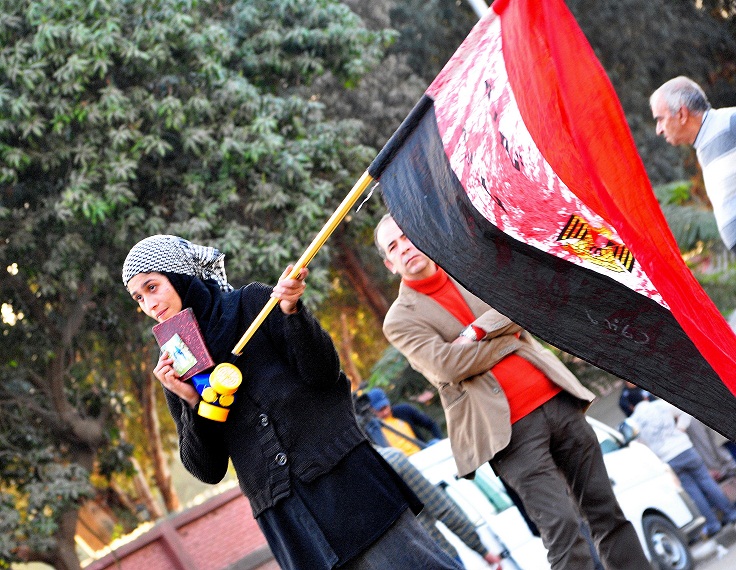A hastily-hung sign outside the theatre warns patrons about “explicit language and content”. The lady behind me seems dismissive, with two kids in tow. She believes this is a play like any other. But the original AUC production “F***”, written and directed by Moustafa Khalil, is anything but ordinary.
The story itself is nothing groundbreaking. Two best friends move back to Egypt together after having spent most of their lives in New Orleans. Adam is chasing ghosts and Zidane is the supportive friend with troubles of his own, he is an accomplished writer with no inspiration for his next work.
What makes the play stand out is the utter disregard for any normal standards of theatre. Khalil simply does not care. Masturbation is mentioned and shown frequently and with relish, much to the discomfort of some audience members. The scenes are disjointed and in no particular order, lending a Tarantino-esque vibe that, combined with spectacular use of lighting and dream sequences, gives viewers the feeling that they are utterly lost in the intricacies of the play but you know what? We don’t really mind. Take us for a ride.
The protagonist, Adam (played by Mohamed Nagi) is furiously trying to reintegrate himself while pursuing shadows of the past. Nagi’s American twang lends his khawaga role that much more believability. His role closes on a sour note however, as after three acts’ worth of quality performances his final scene is angst-ridden to the point of depression.
His best friend, Zidane, is none other than writer-director Khalil. The character shows great depth throughout the play, acting as a father, brother and best friend to Adam as well as an eccentric character from his unfinished work. The one dim note was that Khalil’s accent did not reflect either an Egyptian or a native of New Orleans, and definitely not a mix of the two. The occasional British word pops out spontaneously, leading several of the exceedingly well-written jokes to flounder.
Comedic relief comes in the form of two characters: the undeniably Egyptian Mohsen and the lovable drunkard Smithy, played by Ramy Allam and Omar Kamal respectively. Allam lends the entire play a much-needed sense of Egyptian-ness, such as interjecting “engiz” (hurry up!) when one of the characters is being unnecessarily, soap-opera-style dramatic. Smithy is what Timon and Pumbaa would have been if they were alcoholics, constantly reminding the moping Adam and the conservative Noha that life is never all that serious.
Not to be missed, in one of the flashes to Zidane’s unfinished work, Kamal plays a sex addict at a group therapy meeting and delivers a long-winded and passionate speech that left the entire audience cheering for more. It ended with a decisive “F*** celibacy!” before the stage turned dark.
“The sex addict scene was different, very different,” says Kamal. “It’s weird to be in that state of mind. It was hard to go from composed to explosive without making it look exaggerated at all.”
Never forget the ladies. Adam’s romantic interest is Aziza (played by Reem Hashem), an animated girl whose role alternates between bouncy cheeriness and moodiness, both of which are pulled off impeccably. Hashem tends to enunciate words a bit too emphatically though, leaving the audience painfully aware that it’s acting.
The not-as-tough-as-she-seems Michaela (played by Nour Refaat) establishes a wonderfully real persona of the best friend delivering dry, offhand witticisms before morphing into a tender humanised figure. The transformation is seamless and unanticipated. Finally, Zidane’s initial love interest Noha (played by Nadine El Shiaty) is an impeccably-played character every Egyptian guy knows well: the cute crush who turns into a stifling ball-and-chain. Her crowning moment involves the shrillest scream this side of a B-horror movie and a cat-fight.
Overall, the play is a well-written work with much promise. Each scene on its own is an emotionally charged and balanced piece, but the play loses coherence when they’re strung together to form a chronological storyline. Adam’s tale ends on a very satisfying note, but Zidane’s arc seems somewhat tacked-on and irrelevant in the grand scheme of things. It ends up feeling like one of those episodes of Friends where the Chandler and Joey arc is hilarious but you groan every time Monica and Rachel come on because their arc is about marriage or something equally dull.



